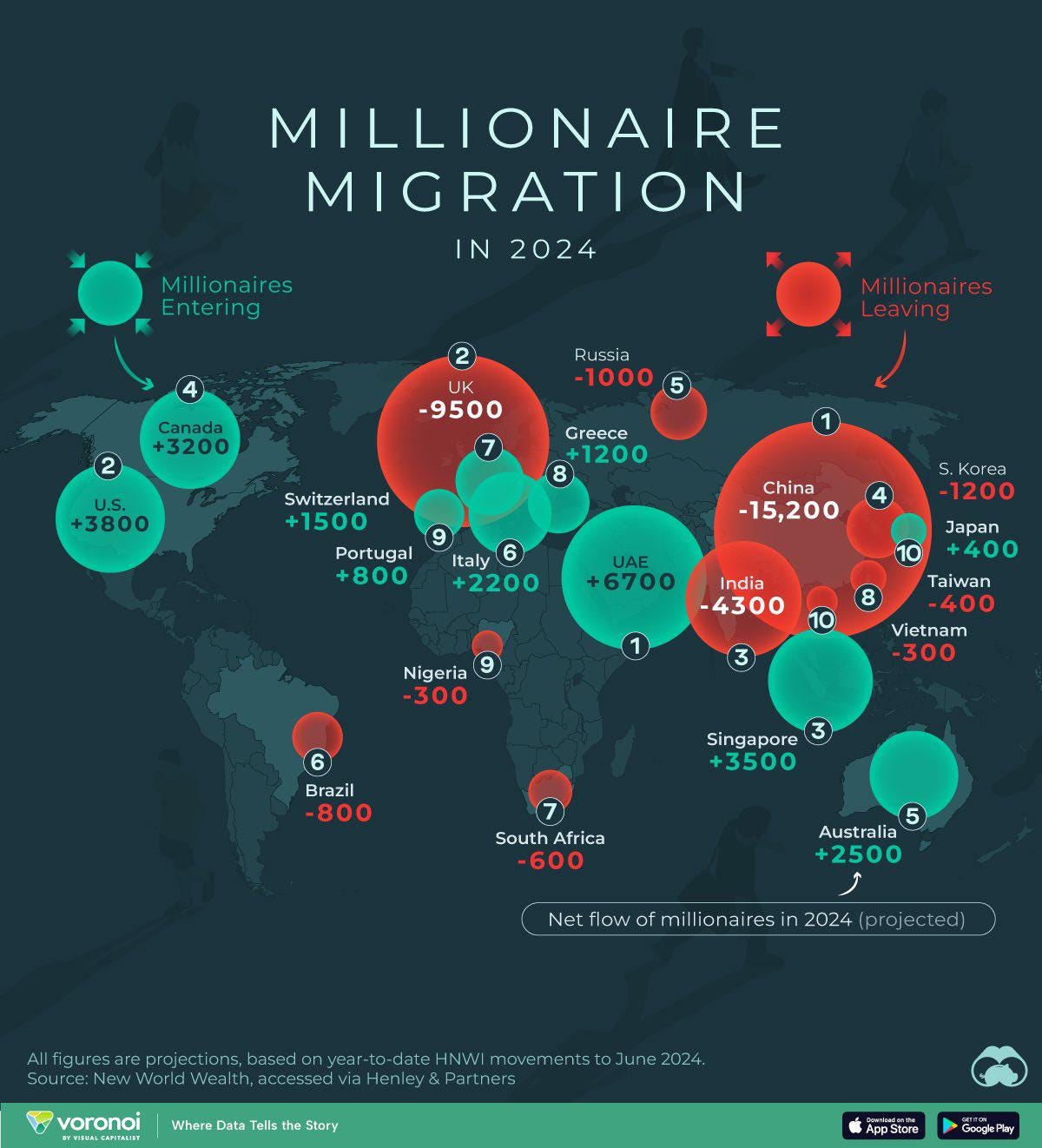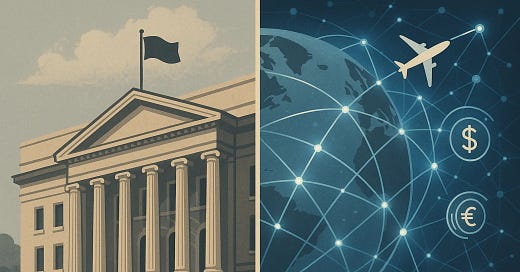Your Government Is a Business, But Which Customer Are You?
Why Governments Are Both Monopolies and Market Competitors
The Duality of the Modern State
The natural conception of a state, i.e, modern nations, is that of an all-powerful entity that rules over territories and people. Also called governments, they make laws, collect taxes, and promote a national identity, and it can sometimes seem like they are immune to most of the forces that the regular person does, but this is not completely true, first of all, entire nations are fully subject to the laws of market economics, for instance;
Countries compete for customers.
Nations fight to attract:
Investors
Talented workers
High Net Worth Individuals
Global Corporations
This is not always obvious to regular citizens, who often feel that their governments don't care about them and have no incentive to help them. That may be partly true, but it's an incomplete picture.
Indeed, most states run two kinds of enterprises simultaneously:
A monopoly business for people who can't easily leave.
A market-facing business for those who can.
This simple model, which describes the behavior and nature of the modern state, is what I call the Two-Tier State.
Tier 1: The Monopoly
Let's face it, the average citizen in any country cannot simply pack up and leave at will. The relationship they have with their government is quite similar to that of a water utility. They have
No easy alternative suppliers
No easy way to switch
No capacity to negotiate prices
This, essentially, is a geographical monopoly over critical services:
Security
Courts and contracts
Property Rights
Basic Infrastructure
Monopolies tend to charge monopoly prices, and the state is no different: because most citizens cannot leave easily, governments can extract taxes, impose rules, misbehave, and otherwise impose costs on citizens well beyond the value of the services they offer, without immediately losing customers.
This is Tier 1
People in this tier share a few characteristics regardless of which specific country they're in. For them:
Emigration is prohibitively expensive
Language and cultural barriers discourage leaving
Legal restrictions make it hard to cut ties with their home countries
Family ties and social networks anchor them
As a result, Tier 1 citizens have little choice but to pay the government's "price," whether in taxes, regulations, or limits on freedoms.
There is another class of entities that have entirely different attributes. These are Tier 2 customers.
High-net-worth individuals
Multinational corporations
Successful Entrepreneurs
Talented professionals
These people and organizations can leave. They:
Move capital around the world at the click of a mouse
Obtain alternative passports and residency permits
Choose legal jurisdictions for business operations
Optimize taxes across borders.
They are extremely profitable for states that can retain them.

To attract and retain Tier 2, governments market governance services like any competitive business. Think about things like
Low tax rates
Efficient court systems
Political stability
Strong Private Property Rights
Ease of Business Policies
State-of-the-art infrastructure
Because there is no higher, global state that has a monopoly of coercion over all states, this is, essentially, A free market. Each state, as an enterprise, is completely free to set its terms, services, and defend itself from aggression without the imposition of a greater state.
This makes for some interesting dynamics.
Countries are already doing this seriously. Places like Singapore, Switzerland, or the UAE have either already built or are explicitly building brands around these services, usually as Luxury brands of governance. Some other countries offer "budget governance" for digital nomads, remote startups, or small-scale investors, think, Georgia's e-residency, Estonia's digital business registration, or the booming real estate in Bali, Indonesia.
Why are Governments running two tiers?
On the surface, it might not seem clear why governments would run two specific tiers of governance, but this is classic customer segmentation. The duality isn't optional, as it follows directly from the demands of globalization and technology.
In the pre-industrial past, nearly everyone was stuck in Tier 1. Emigration was rare, expensive, and dangerous. Today, talent, money, technology, and organizations move and flow fluidly across borders.

Governments can extract revenue from Tier 1 because it's their stable base and they have monopoly power over that segment, but they also desperately want Tier 2 because there are outsized returns.
The wealthy generate disproportionate tax revenue
Corporations bring jobs and economic dynamism
Talent drives innovation and productivity.
Therefore, states must balance two orthogonal imperatives,
Control and extraction from those who can't leave
Competition and marketing to win those who can
The resulting tension is palpable
It's not always possible to please both tiers at the same time, and while that might imply to the average person that states can simply ignore Tier 1 and focus all their efforts on Tier 2, this is simply not the case. As we've said earlier, States can charge monopoly prices to their captive, Tier 1 customers, but monopoly prices cannot be arbitrarily large.
Depending on the expectations of the Tier 1 customers, if the price gets too high, they simply consume fewer state services, refuse to pay, and/or create black markets. In the worst scenario, they refuse the 'social contract' altogether and attack the state.
At the same time, however, Tier 2 customers are quite demanding. They have options and are not afraid to make that clear. States must then balance the needs of these two segments as much as they can, even when they conflict, for example,
High taxes can help fund welfare for Tier 1, but scare away Tier 2
Harsh laws enforce social control over Tier 1, but look unattractive to Tier 2
Populism is almost always highly attractive to Tier 1 but horrifying to Tier 2
Nativist policies may favor Tier 1 but negatively impact Tier 2
We can take China as an example here, Where social and capital controls may benefit Tier 1 customers, but are corrosive for Tier 2 players, or, on the other end, Ireland, whose extremely favorable tax policies has lead to an incredible influx of Tier 2 customers, but there is a clear strain on Tier 1, the average Irishman who is getting squeezed.
Zombie States: All Round Failures
As is the case in every free market, some firms fail, and as for monopolies, they can be dysfunctional. Zombie states are those states that have had the unfortunate privilege to fail spectacularly in both cases. They,
Extract just enough from Tier 1 to stay alive
Offer nothing compelling to Tier 2
Fail to provide services that legitimize their existence to either Tier 1 or Tier 2
Lose economic participation from Tier 1 and foreign investment from Tier 2
These are zombie states. Off the top of my head, and no offense here, I can think of Venezuela, Eritrea, and North Korea. They survive off resource rents if they have any, foreign aid, or predatory extraction from immobile populations. These are the ultimate cautionary tales in the business of governance.
The New Language of Governance
We can derive some interesting conclusions by thinking this way. For example:
Democracy is a service: It gives citizens the feeling of participation, which increases the perceived value of governance.
Subsidies are like discounts: sometimes, states subsidize living costs to mask governance inefficiencies and artificially increase the perceived value of governance.
Tax Policy is a pricing strategy; Therefore, it can't be the case that low taxes are always good. It's more a matter of how it relates to the perceived value of governance, the marketing strategy, and the target audience.
And then we can start to understand why some states succeed spectacularly, others burn through resources unsustainably, and why new experiments like network states and charter cities can introduce new forms of disruptions to the business of governance, albeit competing as pure Tier 2 plays.
Why This Matters
The world is shifting towards a true Marketplace of Governance
Competition for Tier 2 is intensifying
The actual size of Tier 2 is increasing
Private governance experiments are gaining steam
Economic laws apply to governments whether they admit it or not.
States that understand their position clearly will thrive, and those that cling to outdated mercantilist ideas will fall behind or collapse.
This post is the first in a blog series where I will explore
The services governments sell
The business models they adopt
Why global tax cartels are doomed
How private governance could disrupt existing states
And much more.
If this sounds interesting, welcome aboard.
We know corporations are optimizing for profits and market share, but what are states optimizing for? And why do they need two tiers to do it?
To find out, stay tuned for the next post, where I cover what states really want.





This is an interesting discussion, one that I have danced around in the past, but haven't fully considered its implications.
The idea here is that modern governments have two-tier economies: one for those people who cannot leave, and a more favorable set of rules for those who can. As countries develop and technology advances, the latter group grows larger, forcing more accommodating policies.
This discussion reminds me of the book, The Dictator's Learning Curve, which argued that dictatorships around the world are learning. Until recently, for instance, dictatorships would typically try to keep their citizens in using walls and exit visas.
Modern dictatorships, however, have learned to let go of those who want to leave. Why? Because they would probably be more trouble than they were worth anyway. Exits create an escape valve for the most passionate, helping preserve domestic stability.
Great read, i am lucky to find this.
I am in for a treat